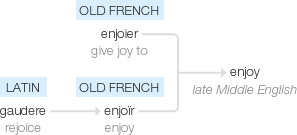Enjoy
late Middle English: from Old French enjoier ‘give joy to’ or enjoïr ‘enjoy’, both based on Latin gaudere ‘rejoice’.
wiktionary
From Middle English enjoyen, from Old French enjoier, anjoier, enjoer(“to give joy, receive with joy, rejoice”), equivalent to en- + joy.
etymonline
enjoy (v.)
late 14c., "rejoice, be glad" (intransitive), from stem of Old French enjoir "to give joy, rejoice, take delight in," from en- "make" (see en- (1)) + joir "enjoy," from Latin gaudere "rejoice" (see joy); Sense of "have the use or benefit of" first recorded early 15c. (replacing Old English brucan, for which see brook (v.)).
Transitive meaning "take pleasure in" is mid-15c. In modern use it has a tendency to lose its connection with pleasure: newspaper photo captions say someone enjoys an ice cream cone, etc., when all she is doing is eating it, and Wright's "English Dialect Dictionary" (1900) reports widespread use in north and west England of the phrase to enjoy bad health for one who has ailments. Meaning "have sexual relations with" (a woman) is from 1590s. Related: Enjoyed; enjoys; enjoying. To enjoy oneself "feel pleasure or satisfaction in one's mind" attested by 1708.
